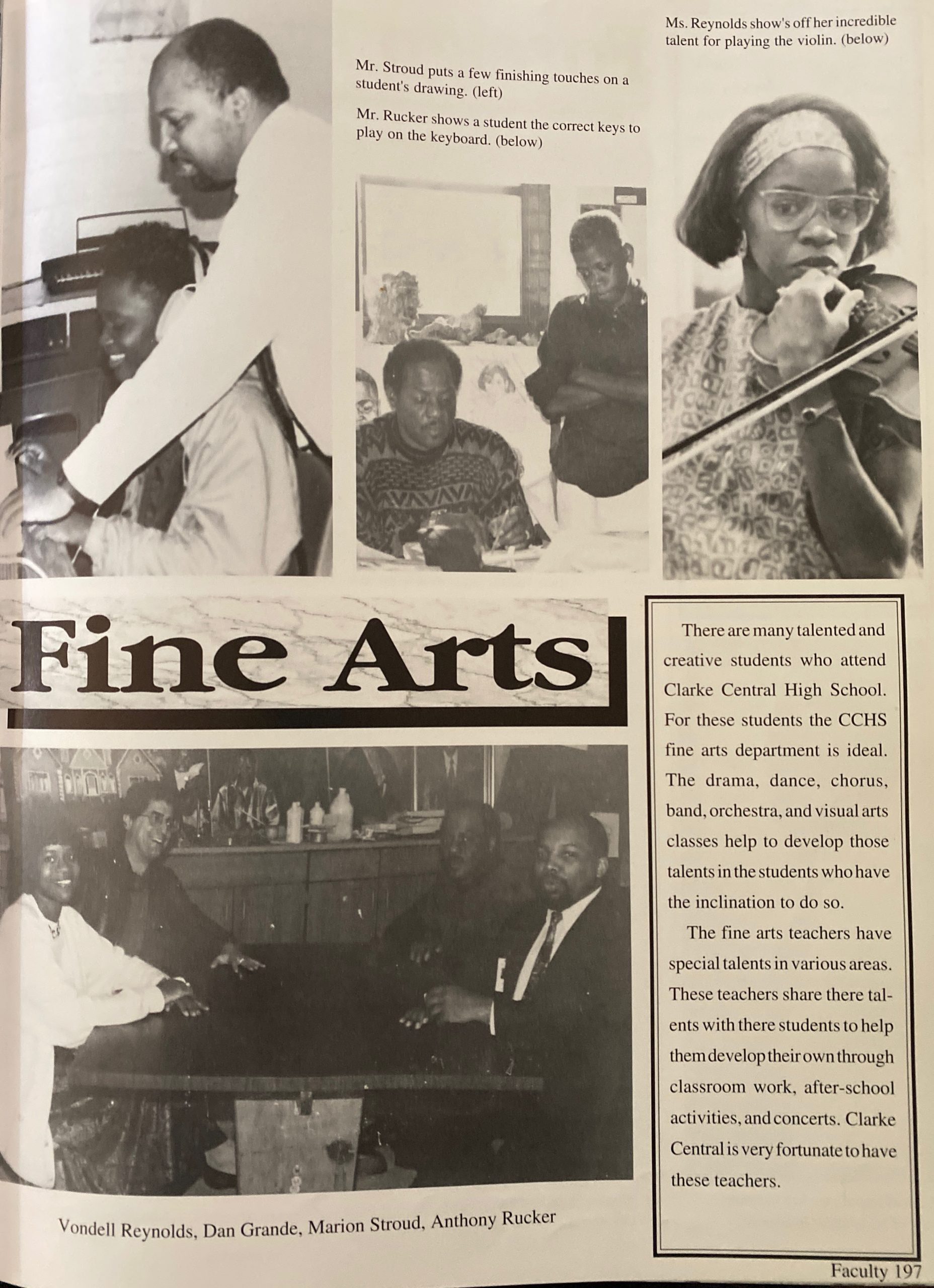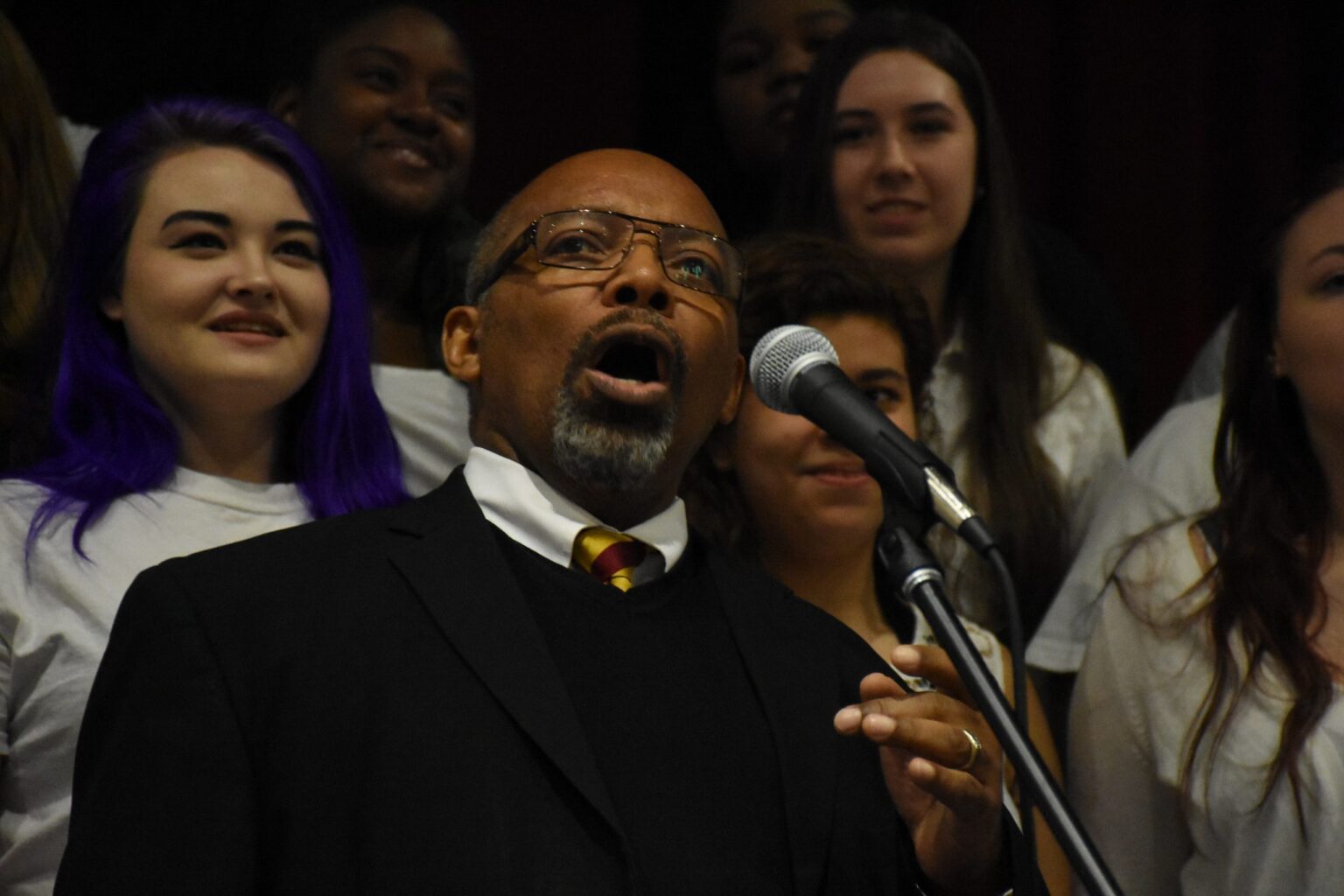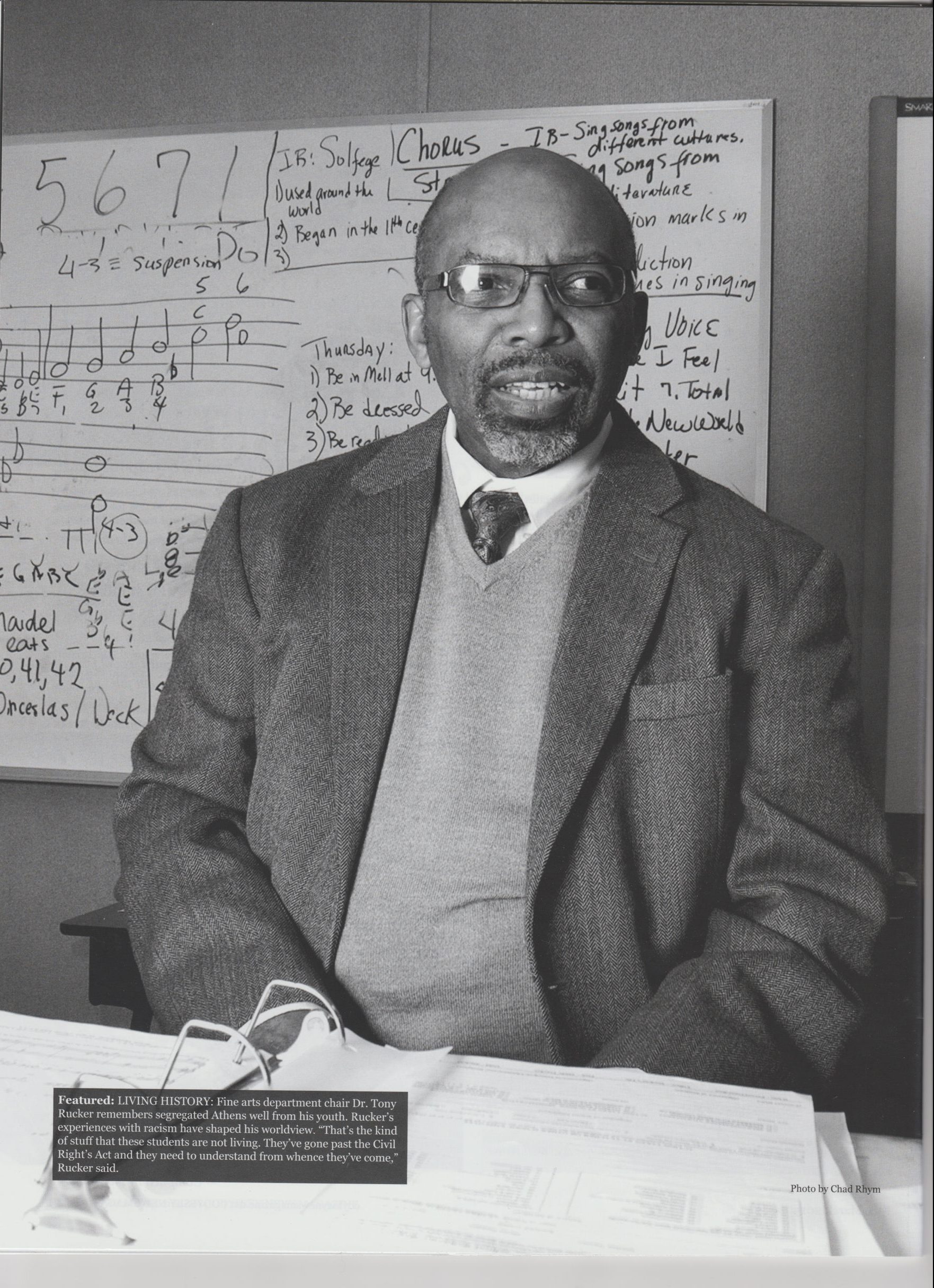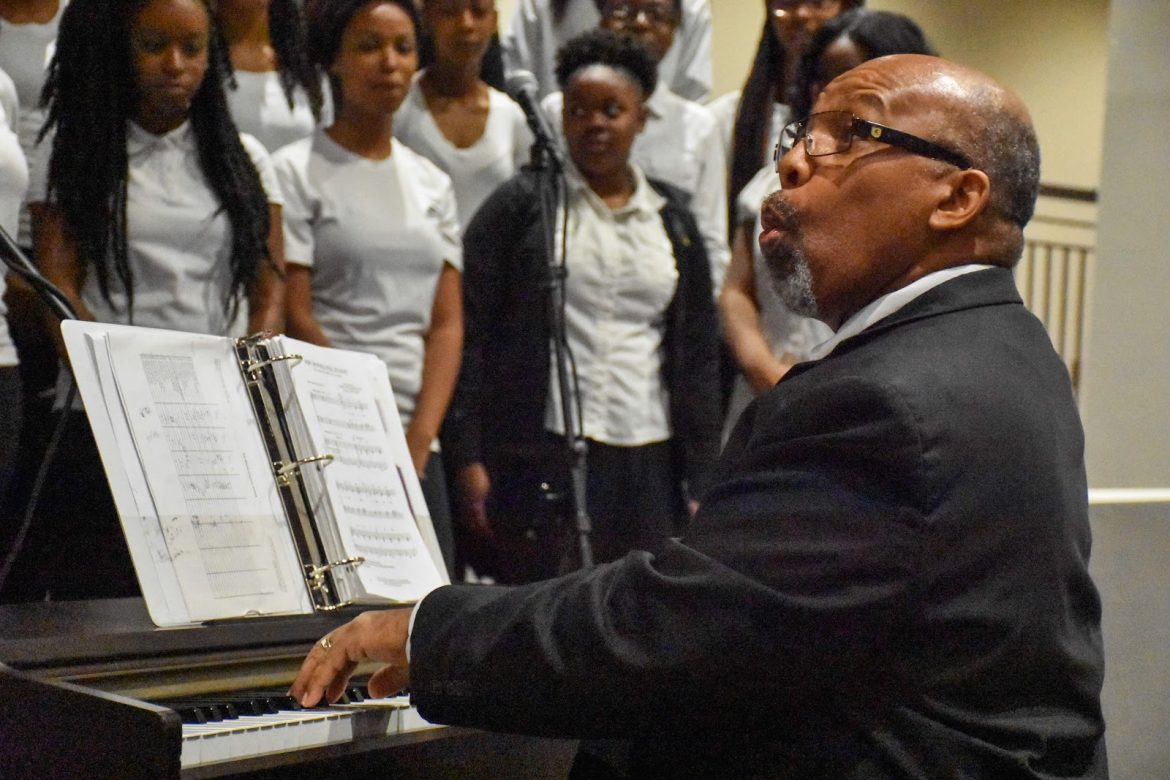Clarke Central High School fine arts department co-chair and chorus teacher Dr. Anthony Rucker leads the CCHS chorus during the Balck History month celebration in the Mell Auditorium on Feb. 16, 2017. Rucker recounts his many years as a chorus teacher and his passion for the arts. “I want (students) to understand that (chorus) is a serious art form even though so many take it for granted,” Rucker said. Photo by Lucia Bermudez
Clarke Central High School fine arts department chair and chorus teacher Dr. Anthony Rucker reflects on his 33 years of teaching as he prepares for retirement.
Viewpoints writer Samaiyah Ra’aid: When did you start teaching at Clarke Central High School?
Fine arts department co-chair and chorus teacher Dr. Anthony Rucker: Well, believe it or not, I started in 1986 as a substitute teacher, and the reason I started that way is because I was coming back from Florida. I was at (Florida State University) and there was a principal that was interested in me and extended the invitation. However, back in November (of 1986) or so, the position (he offered) was not open but he said he wanted me to substitute teach, which was fine. So as I moved back here, I became a substitute teacher at Clarke Central (High School), mostly. I went to other places but I enjoyed going to Clarke Central most of the time. And then in 1986, I think is when I started. In 1987, I think our principal (Dr. Swade Huff) was a junior or senior at that time, but that’s when I started at Clarke Central, and I’ve been there ever since.
“Well, believe it or not, I started in 1986 as a substitute teacher, and the reason I started that way is because I was coming back from Florida.”
— Dr. Anthony Rucker,
Clarke Central High School fine arts department chair and chorus teacher
SR: What was it like then?
AR: Very different, very, very different. Now (we) didn’t have this kind of technology that we have now. Y’all are just so blessed with the modern technology that you have and are able to use. Also, it felt like more students were involved in different school activities: always football, always basketball. (It) seem(ed) like we had more participation or they were there, mostly at more games and stuff. So, I guess they weren’t at home playing video games. They came to school, you know, to do different things. It was so hard at the time, I think because we were using textbooks. Not chorus, not for piano, but it was (more) textbook-oriented than it is now (which is more) media-oriented.

A page from the Clarke Central High School yearbook, the Gladius, shows teachers and students involved in CCHS fine arts. CCHS fine arts department chair and chorus teacher Dr. Anthony Rucker has had two kids go to CCHS, and both participate in the fine arts while in school. “Both of my children graduated from Clarke Central High School. One graduated in 94′ I believe, (and) one graduated in 2003. (Them being at CCHS) was very welcomed. It was very rewarding to see my kids,” Rucker said. “Although I didn’t teach either one of them at Clarke Central. My son was more interested in band and basketball. My daughter did band and she had other interests, (like) dance, but mostly she was in the band at Clarke Central.” Photo courtesy of the Gladius
SR: You’ve been in a department chair for years. Why are the performing and fine arts important?
AR: It’s so, so important (because) number one, we call our subject core because it’s a fulfillment of the rest of parts of your life on creativity, reproduction of whatever, like, drama, characterization, playing instruments, whatever is a part of life. It has been said that you look around. Everywhere you look, you see a piece of art. There’s art everywhere. You listen, there’s art everywhere. Whether you want to do it as a profession, hey, great. That’s why it’s important. We want to nurture creativity, we want to nurture a skill. That kind of thing for students, so it’s core. It’s a part of human nature to be artistic and also, you know to want to go in one of these fields and I feel like my part has been to, simply put, (help them). I have about five teachers that I know of that I’ve taught at Clarke Central and elsewhere at my first couple of jobs and that to me is very rewarding.
One of the closest students is the chorus director at Oconee County High School. (They were) one of my students and there have been others. Now, I’ve had some part they’ve gone to either work on Broadway or one went to a school in Maine, I think, (or maybe) Boston. But anyway, I feel like those successes have been really rewarding.
SR: Who are some of the colleagues that you taught?
AR: Well, like I said, one person is (a) teacher at Oconee County High School. Another person that I taught, his name is Mark Butler. He’s a chorus director (now). He’s been a chorus director in Atlanta, and also he’s been down in Albany, Georgia. Now, I think now he’s out at a college somewhere. I’m not sure exactly where he is. Who else? There have been a few people. Lily Lewis, she’s a performer. There are some people at (the University of Georgia). When I was at UGA, I did a group called the Promoted Singers and this young lady is a performing artist. They just call her BJ, Betty Rogers, but either way she’s been performing a good bit in Atlanta. There are others but those are the ones I can think of right now off of the top of my head.
SR: What did you find to be the most rewarding part of being a teacher?

Dr. Anthony Rucker, the Clarke Central High School fine arts department chair and chorus teacher, speaks at the CCHS Black History Month Celebration on February 16, 2016. Rucker believes that getting his doctorate was a tough experience, but one that was worth it. “The way that I did it, it was fun, it was grueling, it was expensive. It was a lot of nights I studied past one (or) two o’clock (in the morning). Sometimes, (I was) a little late to school because I was up studying,” Rucker said. “Getting the doctorate was, whew. All I have to say I was blessed through the whole process. It took me eight years to finish it. So, when I finished I was working (on it), I was finally working at Clarke Central.” Photo by Johanna Hall
AR: Well, it’s just like my major professor says, “If you teach and students learn, that’s probably one of the most rewarding things.” The answer to that question is that there are three events that I feel like have really (impacted me). One was I had the chance to take a group from Clarke Central to New York and we toured New York. We did sing. We went to Carnegie Hall, and we sang Happy Birthday to one of our members. We had a chance to go to Harlem, matter of fact we went to climb the Statue of Liberty. That’s one major accomplishment. I think to be able to take a group to New York like that. Other things that were really, really important was, I would say there were two musicals we did at Clarke Central. The two musicals were “Chicago” and “Les Miserables”. Both of those works were done in coordination with Cedar Shoals High School. Now think about that. We’re rivals, we’re artists, we are hand in hand, we are fellow artists.
Those two shows were probably the highlight because I was the music director. I played the piano. I had the best musicians, I had the best singers, it was just awesome. There was a little problem (performing “Les Miserables”) because it snowed. We had to delay. We finally got it off by doing two performances at Clarke Central and two performances at Cedar Shoals. We did the same thing, the four performances. Two performances at Clarke Central and two at Cedar Shoals for “Chicago” (in) the early 2000s. And the last thing, the third thing was very rewarding was, about three years ago, I took the group to a (chorus) festival and I’d never (scored) a one, (the highest score), at a chorus festival. We were able to (score) a one. One of the judges gave us a one for our performance and this was very, very inspiring. I was just beside myself because it was just one of the things that I’ve always wanted to do. That one was really, really wonderful.
SR: Did you ever have like a set time that you wanted to retire?
AR: The first time I wanted to retire was at the age of 58. My mother retired at the age of 58 and she had been a substitute teacher for about 18 years after that substituting filling in for teachers. I thought she (was) gonna come home and garden and that kind of stuff but it didn’t work. The next age was the one that I just passed which is the age of 66. Actually, I wanted to stop at 65 and I didn’t quite make that one so I guess I’m one year off of that one. So I decided to wait (for) one year. So yes, I wanted to stop at the age of 65 and then after that, I wanted to do some things like travel, but I’m also a church musician. The traveling will be a little here, a little there. But at this point, what I’ve decided to do is to continue to teach part-time and also continue with my church work.
SR: What are you looking forward to most about retiring?
AR: I’ve always wanted to go back and be a member of a singing group. Maybe a community group is one thing. I also wanted to pick up on some of my writing. I’ve done probably about four or five religious type works that I’ve done for (my) church. I want to pick that back up again. Pretty much travel is the last thing (I want to do). I’ve been to a number of places that I’d like to go back to. Not at this time but Italy, (my family) went two years ago (and it) was one of my most favorite trips. I’ve been to Greece, I’ve been to Hong Kong, I went over to China, Germany, Africa, Hawaii, but there’s other places that I’d like to go.
“I also wanted to pick up on some of my writing. I’ve done probably about four or five religious type works that I’ve done for (my) church. I want to pick that back up again. Pretty much travel is the last thing (I want to do). I’ve been to a number of places that I’d like to go back to.”
— Dr. Anthony Rucker,
Clarke Central High School fine arts department chair and chorus teacher
SR: What are you going to miss most about teaching?
AR: The part that I think I’m going to miss, although I might still do one here one day, is the musicals. Musicals are just one of the highlights of my year, because you deal with some of the best musicians and some of the best singers and (even) if they weren’t, they were the ones who you would want in your choir. They would be the ones who really would try hard at improving daily. That’s the thing, like I was saying. If they learn, that’s the exciting part of teaching and if they change, their skills increase. That’s the exciting part.
SR: What do you want to be the greatest impact that you leave on your students with your retirement?
AR: The first time I wanted to retire was at the age of 58. My mother retired at the age of 58 and she had been a substitute teacher for about 18 years after that substituting filling in for teachers. I thought she (was) gonna come home and garden and that kind of stuff but it didn’t work. The next age was the one that I just passed which is the age of 66. Actually, I wanted to stop at 65 and I didn’t quite make that one so I guess I’m one year off of that one. So I decided to wait (for) one year. So yes, I wanted to stop at the age of 65 and then after that, I wanted to do some things like travel, but I’m also a church musician. The traveling will be a little here, a little there. But at this point, what I’ve decided to do is to continue to teach part-time and also continue with my church work.
SR: Can you compare your first day of teaching to your last day?
AR: My first day of teaching I taught at my old middle school, which is in Jefferson, Georgia. The first day the kids were good and I taught most of the middle school for that first part of the year. The next part of the year I was asked to come and help with the band. That first day of teaching was good and they listened, but after a while, you found out the ones who were mysterious, the ones who were going to listen or not. Then, all of a sudden, they started changing. It was very, very different. We were moved to a better room for chorus.It was mixed (behavior) after their first day. Then, you find out who’s serious and who’s not serious. I was helping the band. I was helping teach instruments at first and what have you. The following year at the same school, I worked for half a year because I got a full-time job dealing with starting a band, but I taught middle school then high school. Those were very good years because they were very important. After that, like I tell all teachers, it took about three years to learn what you need to know about teaching as far as responding to students, as far as being prepared and having things. The way that I prepared was a little different than they are prepared nowadays. I wish I had a few more skills at that time but it makes you learn.

Clarke Central High School fine arts department chair and chorus teacher Dr. Anthony Rucker sits at his desk in January of 2015. Rucker is passionate about singing and wants others to take the craft seriously. “I want (my students) to know that singing is serious, learn what you can. Do all kinds of art forms of singing that you can and it makes you a better person. Look at Beyoncé,” Rucker said. “Some of these (singers) have studied some people to learn some of the craft. If you’re serious about it, it’s serious. If you want to just do it for the community or whatever, you still need to be serious because you want to do it right.” Photo from the ODYSSEY archives
The last days of teaching. I’m kind of a little somber. I wanted to finish out the year. We were getting ready for concerts, getting ready to take kids to sing in the community at Piedmont Hospital (Piedmont Athens Regional) and then, all of a sudden, it just felt like things caved in for the last days that we had at Clarke Central. After that, you know, I kind of booted up and tried to figure out, you know what the administration wanted us to do as far as the (social) distance learning, and what have you. It’s still a little sad not to be able to see students still have to, you have to be able to see students on a regular basis. There are some that I’ve talked to over (Google) Hangouts and Zoom. I also felt like during the year, I’ve taught a lot about reading different songs, getting ready for performances. This year, I guess I should say one of the more delightful things that I was able to do was I took a group of about 16-17 young ladies to sing at the Martin Luther King Jr. Scholarship Banquet, down at the Classic Center. We’ve done one before but this time was just probably one of the best performances that I’ve ever done. It was about four or 500 people there.
I think back on those kinds of things. The Christmas concert performance that we did so that kind of keeps me inspired that the job is done the best I could. I can teach students to hopefully inspire them to continue in the choral field. And I don’t want to forget piano. I’ve taught piano since probably my second year of teaching at Clarke Central because I wanted to start piano classes. Those were wonderful, wonderful days as well.
SR: Is there anything else that you would like to add?
AR: Well, I’d just like to add that the students that I have inspired — and I do get messages periodically from those who have learned something from my teaching — I’m hopeful that I’ve inspired them enough to be able to continue in music, whether it’s singing, whether it is playing piano, whether it is performing in drama, musicals, I’m just hopeful for the teaching in the field and that they will continue to use those skills. Not only that, support other performances, chorally, band-wise, orchestra-wise because these students spend a lot of time in preparation. Teachers spend a lot of time in preparation, and it’s just like performers who go out to perform. They’re going to be admired and they’re going to be paid. It’s quite a culture of students to continue to support the arts, that’s basically what I want to say.
To read more about Dr. Anthony Rucker’s work supporting the students and CCCHS community, visit our archives.
